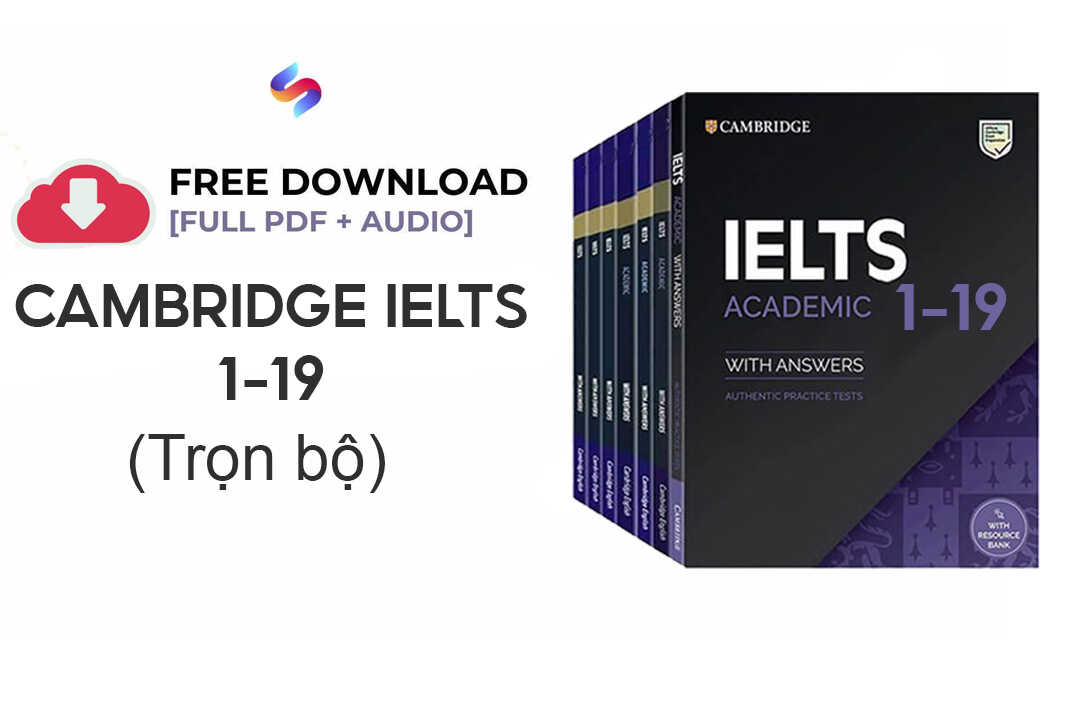Thầy giáo Nguyễn Anh Đức Là một chuyên gia đầy đam mê trong lĩnh vực giảng dạy tiếng Anh và phát triển tiềm năng con người, thầy Nguyễn Anh Đức được mệnh danh là “phù thủy tiếng Anh” nhờ những phương pháp sáng tạo và hiệu quả. Với tầm nhìn đổi mới giáo dục, thầy không ngừng ứng dụng công nghệ hiện đại như thực tế ảo và trí tuệ nhân tạo để mang đến trải nghiệm học tập độc đáo. Là diễn giả truyền cảm hứng, thầy đã khích lệ hàng chục nghìn học sinh, sinh viên và thanh niên trên hành trình chinh phục tiếng Anh và vượt qua giới hạn bản thân. Mục tiêu lớn nhất của thầy là xây dựng một thế hệ trẻ tự tin, làm chủ ngôn ngữ và sẵn sàng vươn ra thế giới.
Tiếp nối chuỗi bài giảng phân tích chi tiết đề bài kèm theo bài viết mẫu ở thang điểm cao (8.0+) cho kỹ năng Viết ở bài luận số 2 (IELTS Writing Task 2), ở bài hôm nay, Smartcom English sẽ phân tích đề thi Viết số 3 trong cuốn sách mới nhất của nhà Cambridge – Cambridge IELTS 19.
Tải miễn phí: Ebook giải đề IELTS Writing CAMBRIDGE 19 (PDF)
Tổng quan dạng bài “Agree or Disagree”
Opinion Essay hay còn được gọi là Agree or Disagree essay là một trong những dạng bài phổ biến nhất của đề thi IELTS Writing Task 2. Với dạng bài này, bạn cần đưa ra quan điểm của bạn đối với vấn đề được trình bày trong đề bài.
Dấu hiệu nhận biết rất đặc trưng của dạng bài này là “agree or disagree”. Trong đó, “Do you agree or disagree? – Bạn đồng ý hay không đồng ý?” hoặc “ To what extent do you agree or disagree? – Bạn đồng ý hoặc không đồng ý ở mức độ nào” khá giống nhau về mặt ý nghĩa. Ngoài ra, bạn cũng có thể bắt gặp câu hỏi “What is your opinion?” đối với dạng bài này. Dù ở dạng câu hỏi nào đi chăng nữa, bạn cũng cần đưa ra ý kiến, quan điểm của mình với vấn đề bằng các luận điểm, luận cứ thuyết phục.

Phân tích đề bài và các bước làm
You should spend about 40 minutes on this task.
Write about the following topic:
It is important for everyone, including young people, to save money for their future.
To what extent do you agree or disagree with this statement?
Give reasons for your answer and include any relevant examples from your own knowledge or experience.
Write at least 250 words.
→ Dịch đề bài: Điều quan trọng đối với tất cả mọi người, kể cả những người trẻ tuổi, là tiết kiệm tiền cho tương lai của mình. Bạn đồng ý hay không đồng ý với tuyên bố này ở mức độ nào?
Bước 1: Xác định rõ yêu cầu của đề bài
Khi đọc đề IELTS writing task 2, có 2 điều mà các sĩ tử cần xác định rõ từ bước đầu tiên đó là: 1. Chủ đề; và 2. Dạng bài. Cụ thể đề bài đã cho được hiểu là: “Điều quan trọng đối với tất cả mọi người, kể cả những người trẻ tuổi, là tiết kiệm tiền cho tương lai của mình. Bạn đồng ý hay không đồng ý với tuyên bố này ở mức độ nào?”
Như vậy, chủ đề của bài này là bàn về tầm quan trọng của việc tiết kiệm, đặc biệt là đối với người trẻ. Dạng câu hỏi là tranh luận và đưa ra ý kiến cá nhân.
Chú ý: Sĩ tử cần luyện IELTS kỹ lưỡng thì mới có thể viết bài luận tiếng Anh học thuật đáp ứng tốt 4 tiêu chí chấm điểm gồm Task Response (Đúng đề, đủ ý), Coherence and Cohesion (Bố cục logic & liên kết mạch lạc), Lexical Resources (Vốn từ vựng phong phú) và Grammatical Range and Accuracy (Ngữ pháp phong phú và chính xác), đồng thời viết trong phạm vi thời gian quy định chỉ là 40 phút với đủ độ dài (tối thiểu là 250 từ, nhưng tốt hơn hết hãy tập viết với độ dài từ 300 từ trở lên để lấy điểm số cao hơn).
Bước 2: Lên dàn ý bài viết
Xin mời bạn nghiên cứu một số kiến thức về chủ đề tầm quan trọng của việc tiết kiệm tiền. Đoạn gợi ý kiến thức và ý tưởng dưới đây được trình bày bằng tiếng Anh để vừa cung cấp kiến thức, vừa cung cấp cấu trúc câu, vừa cung cấp vốn từ tiếng Anh cho bạn.
Đoạn Counterargument – Phản biện: Youth and present enjoyment (Tuổi trẻ và sự tận hưởng hiện tại)
- Focus on experiences (tập trung vào các trải nghiệm)
- Youth is a time for exploration and enjoyment, not financial constraints.
- Young people should prioritize experiences, traveling, and building social connections over saving money.
- No urgency to save (không cấp thiết phải tiết kiệm)
- Young people have ample time to earn money in the future, so there’s no immediate need to start saving.
Đoạn Favored argument: The importance of early saving (Tầm quan trọng của việc tiết kiệm sớm)
- Financial security (sự an toàn tài chính)
- Saving money from a young age provides a financial cushion during unpredictable events like job loss or medical emergencies.
Investment opportunities (các cơ hội đầu tư)
- Early savings enable young people to capitalize on opportunities such as higher education or starting a business, contributing to long-term financial stability and personal development.
Đoạn Own opinion: Balancing enjoyment and financial responsibility (Cân bằng giữa niềm vui và trách nhiệm tài chính)
- Developing discipline (tạo nên kỉ luật)
- While it’s important to enjoy life, the habit of saving instills financial responsibility and discipline that benefits individuals throughout their lives.
- Finding balance (tìm ra sự cân bằng)
- Individuals should strike a balance between ensuring financial stability and achieving personal fulfillment.
Bài luận mẫu
In today’s society, the importance of saving money is often emphasized as a critical habit for securing a stable future. This notion is particularly relevant for young people, who are at the beginning of their financial journey. While some may argue that the youth should prioritize living in the present rather than concerning themselves with future financial security, I firmly believe that saving money is indispensable for everyone, including the younger generation.
On one hand, opponents of the idea that young people should save money argue that youth is a time for exploration and enjoyment, not for financial constraints. They believe that young individuals should focus on gaining experiences, traveling, and building social connections rather than worrying about their future finances. For example, some argue that spending money on activities such as traveling or pursuing hobbies enriches life and contributes to personal growth in ways that saving money cannot. Additionally, they point out that young people have their entire lives ahead of them to earn money, so there is no immediate need to start saving.
However, I contend that developing a habit of saving money from a young age is crucial because it fosters financial security. Life is unpredictable, and having a financial cushion can provide security during unexpected events, such as job loss or health emergencies. For instance, young adults with savings are better equipped to handle sudden medical expenses or periods of unemployment, thereby reducing stress and anxiety. Additionally, saving money early allows young people to capitalize on investment opportunities, such as higher education or starting a business, which can lead to greater financial stability in the future. These investments not only contribute to personal development but also pave the way for a more secure and prosperous life.
In my view, while it is important to embrace life and embrace new experiences, the benefits of saving money cannot be overlooked. Cultivating the habit of saving from a young age instills a sense of responsibility and financial discipline that will serve individuals well throughout their lives. It is not about sacrificing present enjoyment for future security, but rather about striking a balance that ensures both financial stability and personal fulfillment.
In conclusion, although there may be arguments against the need for young people to save money, the long-term advantages far outweigh the short-term enjoyment. By saving money, young people can ensure their financial stability, take advantage of future opportunities, and ultimately lead more secure and fulfilling lives.
(408 words – band 8.0)
Đánh giá bài viết theo 4 tiêu chí chấm điểm
Task Response: 9/9
Bài viết trả lời đầy đủ yêu cầu của đề bài, đưa ra quan điểm rõ ràng rằng tiết kiệm tiền là điều cần thiết đối với tất cả mọi người, kể cả giới trẻ. Người viết đã thảo luận cả hai quan điểm, bao gồm lý do vì sao một số người cho rằng thanh niên nên tận hưởng cuộc sống thay vì lo lắng về việc tiết kiệm, và sau đó phản bác bằng cách nhấn mạnh tầm quan trọng của việc tiết kiệm tiền.
Coherence and Cohesion: 9/9
Bài viết có cấu trúc rõ ràng và mạch lạc, với các đoạn văn được tổ chức tốt và phát triển hợp lý. Các từ nối như “On one hand,” “However,” “For instance,” và “In conclusion” được sử dụng hiệu quả để kết nối các ý tưởng.
Lexical Resource: 8/9
Vốn từ vựng của người viết khá phong phú và chính xác, sử dụng nhiều từ ngữ học thuật như “financial security,” “investment opportunities,” “capitalize on,” và “prosperous life.” Những từ này thể hiện sự nắm bắt tốt về ngôn ngữ liên quan đến tài chính và cuộc sống.
Grammatical Range and Accuracy: 8/9
Người viết đã thể hiện khả năng sử dụng nhiều cấu trúc câu phức tạp khác nhau, bao gồm các câu phức và câu ghép như “While some may argue that the youth should prioritize living in the present rather than concerning themselves with future financial security, I firmly believe…”
Overall: 8.5
Bài viết đã hoàn thành tốt nhiệm vụ với lập luận rõ ràng và vốn từ vựng phong phú. Cấu trúc bài viết mạch lạc, dễ theo dõi, mặc dù có thể cải thiện thêm về ngữ pháp và sự chính xác trong một số câu.
Từ vựng cần học
emphasize /ˈɛmfəˌsaɪz/ (v): nhấn mạnh
securing a stable future /sɪˈkjʊərɪŋ ə ˈsteɪbl ˈfjuːʧər/: đảm bảo một tương lai ổn định
notion /ˈnəʊ. ʃən/ (n): khái niệm, quan điểm
financial journey /faɪˈnænʃəl ˈʤɜːni/: hành trình tài chính
financial security /faɪˈnænʃəl sɪˈkjʊərɪti/: an ninh tài chính
indispensable /ˌɪndɪˈspɛnsəbl/: không thể thiếu
financial constraints /faɪˈnænʃəl kənˈstreɪnts/: hạn chế tài chính
social connections /ˈsəʊʃəl kəˈnɛkʃənz/: những kết nối xã hội
immediate /ɪˈmiː.di.ət/ (adj) ngay lập tức
foster /ˈfɒstər/ (v): thúc đẩy
financial cushion /faɪˈnænʃəl ˈkʊʃən/: dự phòng tài chính
unexpected events /ˌʌnɪkˈspɛktɪd ɪˈvɛnts/: sự kiện bất ngờ
job loss /ʤɒb lɒs/: mất việc
health emergencies /hɛlθ ɪˈmɜːʤənsiːz/: khẩn cấp về sức khỏe
medical expenses /ˈmɛdɪkəl ɪksˈpɛnsɪz/: chi phí y tế
capitalize on investment opportunities /ˈkæpɪtəlaɪz ɒn ɪnˈvɛstmənt ˌɒpəˈtjuːnɪtɪz/: tận dụng cơ hội đầu tư
higher education /ˈhaɪər ˌɛdʒʊˈkeɪʃən/: giáo dục đại học
start a business /ˈstɑːtɪŋ ə ˈbɪznɪs/: khởi nghiệp
pave the way /peɪv ðə weɪ/: mở đường
prosperous life /ˈprɒspərəs laɪf/: cuộc sống thịnh vượng
embrace new experiences /ɪmˈbreɪs njuː ɪksˈpɪərɪənsɪz/: đón nhận trải nghiệm mới
cultivate /ˈkʌltɪveɪt/ (v): nuôi dưỡng
financial discipline /faɪˈnænʃəl ˈdɪsɪplɪn/: kỷ luật tài chính
sacrifice present enjoyment /ˈsækrɪfaɪsɪŋ ˈprɛznt ɪnˈʤɔɪmənt/: hy sinh sự hưởng thụ hiện tại
strike a balance /ˈstraɪkɪŋ ə ˈbæləns/: đạt được sự cân bằng
financial stability /faɪˈnænʃəl stəˈbɪlɪti/: sự ổn định tài chính
long-term advantages /ˈlɒŋ-tɜːm ədˈvɑːntɪʤɪz/: lợi ích dài hạn
Tham khảo thêm: Giải đề IELTS Cambridge 19: Chi tiết Writing Task 2 [Test 2] (Bài luận chủ đề giảm giờ làm và tăng ngày nghỉ)
Hy vọng là bài giảng giải đề IELTS Cambridge 19: Chi tiết Writing Task 2 [Test 3] trên của các chuyên gia IELTS tại Smartcom English đã cung cấp cho bạn cái nhìn tổng thể, và lời giải chi tiết cho câu hỏi về Agreeing vs Disagreeing. Bài viết không đi sâu vào ý tưởng phức tạp hay từ vựng khó, mà chỉ tập trung giải quyết ý tưởng dễ thấy và từ vựng hữu ích, dễ dùng và ưu tiên chuỗi logic trong cách lập luận.
Để học sâu hơn các bài giảng này, bạn cần đến lớp học trực tiếp hoặc sử dụng hệ thống giảng dạy online của Smartcom English để hấp thụ nhanh và sâu hơn kiến thức viết IELTS, đồng thời học theo chuỗi bài có tính logic, và hệ thống hóa, giúp dễ nhớ và nắm được vấn đề một cách toàn diện hơn.
Hãy comment ở dưới nếu bạn muốn Smartcom English giải thêm những đề bài viết mà bạn quan tâm, hoặc góp ý để chúng tôi cải thiện hơn. Và nếu bạn còn đang băn khoăn không biết học IELTS ở đâu tốt và liệu chi phí học IELTS có phù hợp? Đừng lo, Smartcom đã thiết kế lộ trình cá nhân hóa giúp bạn tiến bộ hiệu quả mà không áp lực về tài chính. Hãy để hành trình chạm tới mục tiêu của bạn bắt đầu từ đây!
By: Smartcom English – IELTS teachers
Kết nối với mình qua
Bài viết khác

![[PDF + Audio] Tải Sách IELTS Cambridge 19 (Kèm đáp án)](https://smartcom.vn/blog/wp-content/uploads/2024/06/ielts-cambridge-19_optimized.png)



![[PDF + Audio] Tải Sách IELTS Cambridge 16 (Kèm đáp án)](https://smartcom.vn/blog/wp-content/uploads/2024/07/ielts-cambridge-16-pdf_optimized.jpg)









